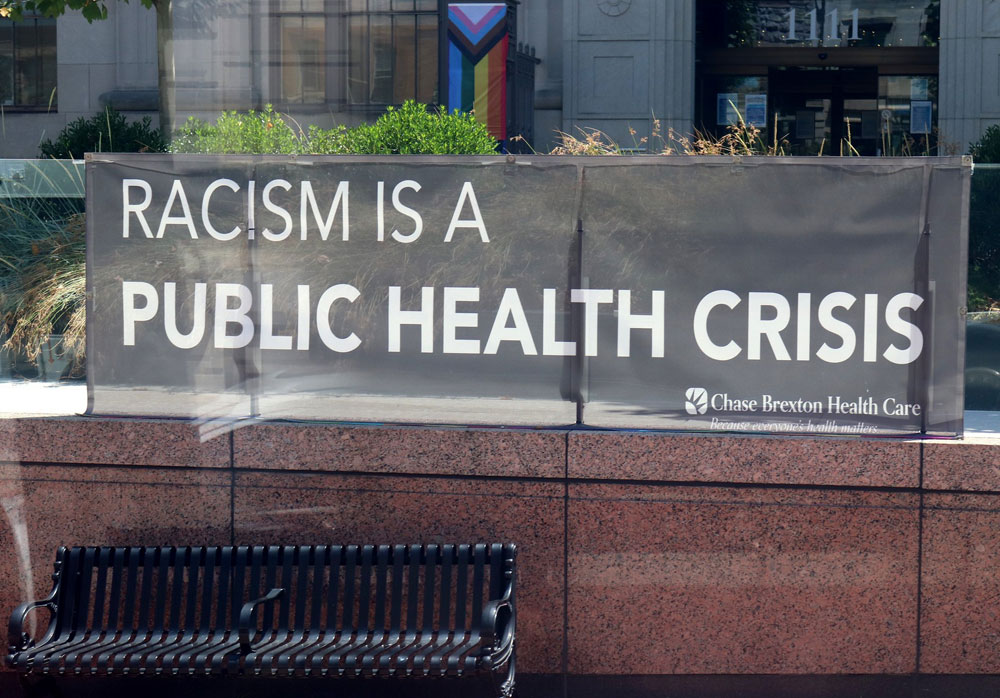
September 15, 2020; Washington Post
Yesterday, Steve Dubb wrote about a resolution in Hillsborough County, Florida, that declared racism a public health crisis. He made reference to the degree to which the practice of centering racial justice has made headway in the last month or so. These efforts are a part of a national attempt to shift narratives underwriting policies that harm Black and brown people at a systemic level.
We often hear physicians and other health experts discuss “racial disparities” when it comes to health issues like diabetes, maternal mortality, or COVID-19. But in the midst of nationwide uprisings against racial injustice, many are calling for these disparities to be recognized not as simple statistical differences but as what they really are: the product of white supremacy in every facet of life, which has had serious health consequences for those who are not white.
Take, for example, the current pandemic. COVID-19 has ravaged communities of color, with Black individuals specifically dying at 2.4 times the rate of white individuals. The framing of “racial disparity” without further analysis might suggest some genetic secret or errant behavior predisposes people of color to dying of the novel disease.
In an interview with the Washington Post, Mary T. Bassett, a physician who also directs the FXB Center for Health & Human Rights at Harvard University, notes that when it comes to health disparities between races, “the usual go-to explanation is that it’s behavioral—that there’s something deficient in the culture or social mores or peer group behavior,” and not structural racism.
The reality is that racism has placed Black and brown people at greater risk through factors that their white counterparts are less likely to live with, such as low-quality housing, polluted water and air, poverty, food insecurity, ongoing stress from racist interactions, and more. The compounded effects of racism are enough to make anybody sick, even under the best of circumstances.
Because of this, activists and politicians are calling for racism to be named a public health crisis and tackled head-on. After decades of advocacy around singular issues like conditions in Black and brown neighborhoods, equal employment opportunities, and police violence, activists and policymakers are looking for a more efficient angle from which to approach the problem.
Sign up for our free newsletters
Subscribe to NPQ's newsletters to have our top stories delivered directly to your inbox.
By signing up, you agree to our privacy policy and terms of use, and to receive messages from NPQ and our partners.
While many of the symptoms of racism that result in health disparities—such as limited access to jobs and housing—are not directly related to public health in the usual sense, declaring racism a public health crisis would force governments to devote resources to address the root causes of racism, rather than just the outcomes.
Across the US, this idea is gaining support: Representative Ayanna Pressley (D-MA) has put forth a bill to create an anti-racism sector within the CDC, and several cities and states have already declared racism a public health crisis and committed to fighting it accordingly.
These efforts would help divert funding toward racial equity efforts, as well as supporting the work of existing entities to dismantle structural racism from all angles. Pressley’s bill in particular calls for the creation of a National Center for Anti-Racism within the CDC, which would oversee research and data collection about racial health disparities and serve as a guiding force in eliminating these disparities. In addition, the bill calls for more attention to the physical and psychological violence perpetrated by law enforcement and for addressing such violence to become a responsibility of the CDC.
Though many are now scrambling to put forth such legislation in the wake of racial justice uprisings, Milwaukee County in Wisconsin was ahead of the curve. The county adopted a resolution declaring racism a public health crisis back in May of 2019, and may serve as an example for other local governments seeking to do the same. Upon adopting the resolution, Milwaukee County Executive Chris Abele stated it was “about action.”
The first step the county took was to implement racial equity training for staff and local leaders, followed by creating a new strategic plan and county budget that emphasize racial equity. The county shared an infographic on their website that outlines the steps taken during the first year after declaring racism a public health crisis. The last step, dated simply “beyond,” suggests that the plan will be complete when “racial equity becomes part of the way Milwaukee County does business through strategic plan implementation, ongoing training, resource development, policy and practice change, and culture change.”
Yet more than one year after adopting the resolution, it is clear that Milwaukee County has a long way to go. The spotlight was turned on racism in Wisconsin in August 2020 when police shot Jacob Blake in Kenosha, just 40 miles outside of Milwaukee. In the aftermath, discussions turned to the long history of segregation and other forms of systemic racism that persist throughout the state, especially in Milwaukee. A new Milwaukee radio show, By Every Measure, seeks to shed light on these systems and the daily effects they have on the lives of black Milwaukeeans, despite recent efforts to mitigate racism. The host, local journalist Reggie Jackson, emphasizes how problematic is to view racism as something that occurs on the individual level rather than examining the policies and institutions that have been used to fortify racism in the US.
Government officials approaching racism as a public health crisis would do well to listen to Jackson. What makes racism different from other public health crises, such as smoking, is that the solution lies primarily with structures and systems rather than individuals. And while the creation of new systems requires both planning for those systems and educating individuals to avoid recreating past mistakes, only time will tell whether Milwaukee county’s efforts will be enough to undo centuries of racism.—Tessa Crisman












